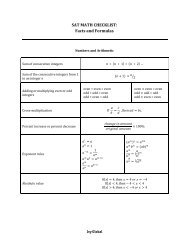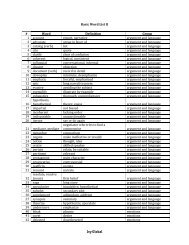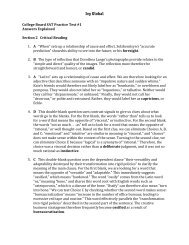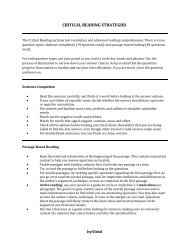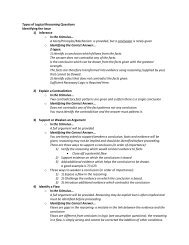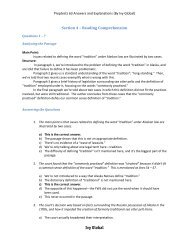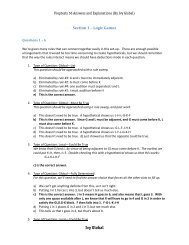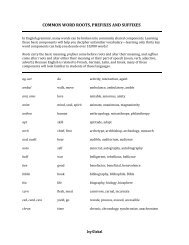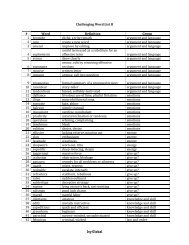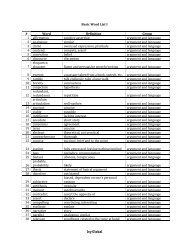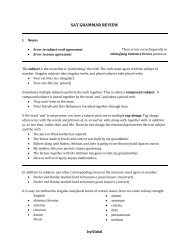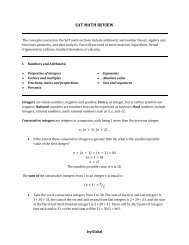Logical Reasoning Answers - Ivy Global
Logical Reasoning Answers - Ivy Global
Logical Reasoning Answers - Ivy Global
Create successful ePaper yourself
Turn your PDF publications into a flip-book with our unique Google optimized e-Paper software.
Preptests 56 <strong>Answers</strong> and Explanations (By <strong>Ivy</strong> <strong>Global</strong>)Section 2 – <strong>Logical</strong> <strong>Reasoning</strong>1. Analyzing the StimulusThe conclusion is decisive: contrary to what people seem to think, it is not more dangerous toswim at night than it is to swim during the day.The evidence is certain: swimmers usually swim during the day because they are afraid of sharkattacks at night, but all recent shark attacks on swimmers have occurred during the day.The reasoning is implicit and informal: since the attacks have all occurred during the day, theday is more dangerous.- What’s wrong with this? If everyone is swimming during the day, then of courseattacks aren’t happening at night. In order to have an accurate assessment, we’dneed to have the same amount of people swimming during the day and during thenight.Answering the Questiona) The argument doesn’t do this. Regardless of this fact, the author’s conclusion is still thatmore attacks occur during the day.b) There’s no evidence that the source is unreliable.c) This is possible, but the argument is about shark attacks, not about why people are afraid ofswimming at night.d) The argument does not presume anything about the knowledge swimmers have.e) This is the correct answer, and fits our prephrase exactly.Double-Checking the AnswerThis is the only answer choice that identifies the author’s flaw in reasoning.2. Analyzing the StimulusDenise argues that the crime rate is only reduced when punishment is certain and severeenough to deter one from recidivism.Reshmi disagrees, arguing that crime is best reduced when educational opportunities areavailable to everyone—this will stop those with limited access to schooling from turning tocrime as the only means to a comfortable lifestyle.Answering the Questiona) This is the correct answer. In both cases people are able to change their minds aboutwhether or not they commit crime.b) Neither argues about the relative importance of crime.c) Denise talks about responses to behaviour, but Reshmi talks about a proactive approach.d) Reshmi talks about economic barriers to education, but Denise doesn’t mention economicneed.e) Denise talks about punishment, but Reshmi takes a proactive approach.Double-Checking the AnswerThis is the only answer choice that both Denise and Reshmi talk about, and that they agree on.3. Analyzing the Stimulus<strong>Ivy</strong> <strong>Global</strong>
Preptests 56 <strong>Answers</strong> and Explanations (By <strong>Ivy</strong> <strong>Global</strong>)Chinh argues that TV producers should not listen to preferences of viewers when makingcreative decision. As evidence, she offers an analogy: great painters don’t consider the views ofmuseum-goers.Lana disagrees, arguing that, since TV is expressly for the viewing public, a TV producer has to bemore than just an artist. They need to take consumer tastes into consideration.Answering the Questiona) Lana doesn’t think that Chinh’s premise requires the conclusion and vice versa. She takesfault with Chinh’s reasoning and analogy.b) There isn’t a sample of consumers here.c) There isn’t any claim that the effect of not considering the public’s taste is the intendedeffect.d) Lana doesn’t think this is a possibility—she thinks that artists are not an accurate analogy forTV producers.e) This is the correct answer. Artists can’t be accurately compared to TV producers.Double-Checking the AnswerThis is the only answer that identifies Chinh’s flaw in reasoning through the context of Lana’sargument.6. Analyzing the StimulusThe conclusion is indecisive: to maintain good cardiac health without having to lower sodiumconsumption, people should eat fresh (not canned) fruit and vegetables.The evidence is certain: fresh fruits and veggies contain potassium, which helps prevent the badeffects of sodium (which can lead to heart disease.)The reasoning is implicit and informal and rests on the assumption that canned and frozen fruitsand vegetables don’t have as much potassium in them as fresh ones.Answering the Questiona) We don’t know anything about the needed ratio of potassium: sodium, so this can’t berequired.b) We’re looking for potassium in these foods, not less sodium.c) The argument doesn’t suggest that potassium is the only way to prevent bad effects, just aneffective way.d) We’re comparing fresh with non-fresh fruits and veggies, so this doesn’t help us.e) This is the correct answer. The fresh ones are better, because they contain morepotassium than the canned ones.Double-Checking the AnswerTo double-check a necessary assumption, we can negate it. If the argument falls apart, it’scorrect. In this case, “Fresh fruits and vegetables do not contain more potassium than docanned or frozen ones,” doesn’t make any sense in the context of the argument, because itclaims that fresh are better.7. Analyzing the StimulusDana intentionally watered a plant every other day, but the plant needed dry soil, and waskilled. Dana intentionally killed the plant.<strong>Ivy</strong> <strong>Global</strong>
Preptests 56 <strong>Answers</strong> and Explanations (By <strong>Ivy</strong> <strong>Global</strong>)- It should be obvious what is wrong with this. Dana intended to water the plant, butthat doesn’t mean she intended to kill it. She may have been unaware of its needfor dry soil.Answering the Questiona) This is similar, but there’s no mention of Jack’s intent or motivation here, so for that reasonit doesn’t match up with our stimulus.b) The conclusion is too weak. “Celeste should know,” makes this a reasonable, and thereforenot flawed, argument.c) This is the correct answer. The restaurant owner intended to do something, and this actioncaused something unrelated or unbeknownst to her to occur, so she intended for that effectto occur also.d) This reasoning is not flawed: Heavy rainFlood is accurate drawn from Heavy rainDambreaksFloode) This reasoning is also accurate: Power plantDecrease in fish from Power plant RaisedtempDecrease in fishDouble-Checking the AnswerThe correct answer is c) because it matches the flaw, tone, and structure of the stimulus.8. Analyzing the StimulusThe conclusion is indecisive: the boulder probably moved to be placed in this area.The evidence is certain: the area around the boulder is sedimentary and covered in glaciers thatmoved from the south. The boulder is volcanic.The reasoning is implied and informal: the boulder is a different type of rock, so wouldn’t havenaturally occurred here. There’s a suggestion that it could have been moved by some southmovingglaciers.Answering the Questiona) “Most boulders” still leaves room for the possibility that the boulder had been moved byglaciers.b) The closest source of volcano is out of scope.c) The closest source of volcano is out of scope.d) This is the correct answer. The conclusion is that the rock moved from the north, and ifthere’s no volcanic rock up there, then it would be invalid to conclude that this area iswhere the rock came from.e) Nearby boulders are out of scope.Double-Checking the AnswerThis is the only answer choice that gets at the gap in reasoning—that, because the boulder isdifferent, it moved from elsewhere—and widens it, thereby weakening the argument.9. Analyzing the StimulusRifka thinks that there`s no need to stop and ask for direction since this would only happen ifshe and Craig were lost (and this implies that she does not believe they are lost).Craig thinks that, because they are lost, they need to stop.Answering the Question<strong>Ivy</strong> <strong>Global</strong>
Preptests 56 <strong>Answers</strong> and Explanations (By <strong>Ivy</strong> <strong>Global</strong>)- What’s wrong with this? We have a causation issue here. The psychologist isassuming that, because entrepreneurs are overconfident, their overconfidence iswhat caused them to become entrepreneurs. Couldn’t they have becomeoverconfident after starting a successful business? The correct answer will bridgethis gap.Answering the Questiona) The content of the questions is out of scope—we need to look at the causation issue.b) The entrepreneurs needn’t have done this. We need something that talks about theoverconfidence issue.c) This is out of scope.d) This is the correct answer. If another group showed overconfidence to be correlated withthe aspect of entrepreneurship that involves starting a business, then the argument isstrengthened.e) Business acumen is out of scope.Double-Checking the AnswerThis is the only answer choice that identifies the gap in reasoning and attempts to bridge it,thereby strengthening the argument.15. Analyzing the StimulusThe conclusion is decisive: the fourth-floor lab will be cleaned out.The evidence is certain: Agnes’s proposal requires the fourth-floor lab to be cleaned out, andImmanuel’s only requires continued use of the second-floor lab. The proposals need thedirector’s support to be approved, and the director will support both proposals.The reasoning is implicit and informal: it confuses a necessary condition for a sufficient one, andassumes that the director’s support alone (which is necessary for approval) is sufficient todetermine approval.Answering the Questiona) The size of the labs is out of scope.b) This is the correct answer. We don’t know that the director’s support is enough to assumethat the proposals will be approved—we just know that it is necessary.c) The level of enthusiasm the director gives is out of scope.d) This is not necessary to the argument, as the conclusion is only about Agnes’s lab.e) We’re told Agnes needs the fourth floor, and we have no reason not to believe that this isn’ttrue.Double-Checking the AnswerThis is the only answer that correctly identifies the flaw in the author’s reasoning.16. Analyzing the StimulusThe conclusion is decisive: offering financial incentives for giving email addresses of friends is anunethical business practice.The evidence is certain: doing so encourages people to exploit personal relationships for profit,and doing so risks damaging the integrity of the relationships.The reasoning is implicit and formal: encouraging people to damage the integrity of personalrelationships is unethical.<strong>Ivy</strong> <strong>Global</strong>
Preptests 56 <strong>Answers</strong> and Explanations (By <strong>Ivy</strong> <strong>Global</strong>)Answering the Questiona) This is a sneaky one, but it’s missing one key point. Remember, it’s unethical for thebusiness to encourage people to do this, not necessarily for people to do it themselves.b) We’re not talking about the usage of the information here; we’re talking about how it’sgathered.c) The word “deliberately” eliminates this answer choice. The business isn’t necessarilydeliberately doing this, they are indirectly doing it.d) This is the correct answer. Encouraging people to do something that damages theintegrity of their relationships is unethical.e) This is stated in the argument is not what we are looking to prove.Double-Checking the AnswerThis is the only answer choice that finds the gap in reasoning, and, stated in general terms,attempts to bridge it, thereby strengthening the argument.17. Analyzing the StimulusGlen thinks that law’s primary role should be to create virtuous citizens, and the emphasis onprocedure creates, instead, a concern with personal rights that leads to individual indifferenceto society’s welfare.Sara thinks, conversely, that this role would encourage governments to make the decisionsabout what is virtuous, which is more dangerous than being overprotective of individual rights.Answering the Questiona) Neither Sara nor Glen actually talks about whether or not citizens can make good choices.Sara simply thinks that government shouldn’t make decision for them.b) Glen thinks this is true, but Sara doesn’t actually say which is more important.c) Sara says this, but Glen doesn’t mention it.d) Glen says this, and Sara implicitly agrees with it.e) This is the correct answer. Glen thinks this is true, but Sara thinks that as primary role thisis dangerous.Double-Checking the AnswerThis is the only answer that touches on a topic that both Glen and Sara discuss, and that theyhave differing opinions on.18. Analyzing the StimulusThe conclusion is indecisive: it’s almost never in cardholder’s interest to skip payments for up tosix months.The evidence is certain: finance charges accumulate during this time and the cost is muchgreater in the long run.The reasoning is implicit and formal: it’s in a person’s best interest to pay less money now thanmore money later.Answering the Questiona) The structure of this argument doesn’t match the stimulus at all.b) We’re talking about something that has a small benefit, but is worse in the long run—notabout something that has a disadvantage but is better.<strong>Ivy</strong> <strong>Global</strong>
Preptests 56 <strong>Answers</strong> and Explanations (By <strong>Ivy</strong> <strong>Global</strong>)c) This is the correct answer. There’s a small immediate benefit but the drawbacks arebigger in the long run.d) The author thinks long-run costs are bad, so this isn’t right.e) This argument doesn’t match the stimulus at all.Double-Checking the AnswerThis is the only answer that matches the principle and structure of the stimulus.19. Analyzing the StimulusLet’s diagram this out, with statements and with contrapositives.Literature ~Physics and Physics (some taking Art)~LiteratureRhetoric~Physics and Physics (some taking Art)~RhetoricAnswering the Questiona) This is the correct answer. Since physics students can’t take literature, and some physicsstudents are taking art, it follows that some art students aren’t taking literature.b) Literature students can take art—it’s just the physics-art combined students that can’t takeliterature.c) There’s no connection between rhetoric and literature, so we can’t determine this.d) There’s no connection between rhetoric and literature, so we can’t determine this.e) We don’t know this for sure. We already know the physics-arts students can’t takeliterature, but whether or not the rest of the art students take literature is up in the air.Double-Checking the AnswerThis is the only answer choice that must be true based on the information given in the stimulus.20. Analyzing the StimulusThe psychologist’s conclusion is decisive: psychotherapists should never provide psychotherapyon talk shows.The evidence is certain and two-fold. Psychotherapists are expected to entertain a broadaudience when giving psychotherapy on talk shows, but this satisfying this demand isincompatible with providing quality psychological help.The reasoning is implicit and informal: psychotherapists should not provide psychotherapy ifthey cannot provide high-quality psychological help.Answering the Questiona) The disconnection comes with providing quality help, not with the entertainment value.b) This would actually weaken the argument, suggesting that quality help is not as important asthe psychologist thinks it is.c) This is a tricky answer choice, but it is too extreme and too broad. The psychologist talksabout a specific situation that isn’t on par with a sweeping statement that therapy should“never be provided” with “any chance” that it’s of lower quality.d) What the audience is seeking is out of the scope of the psychologist’s argument.e) This is the correct answer—the therapy should be of high quality or it should not bepresented.21. Analyzing the Stimulus<strong>Ivy</strong> <strong>Global</strong>
Preptests 56 <strong>Answers</strong> and Explanations (By <strong>Ivy</strong> <strong>Global</strong>)Tania thinks that good art critics aren’t ‘fair’ in the normal sense of the word, for true unbiasedopinions only come from things one is not interested in, and art is a passion.Monique thinks that art is not just a passion, and that the best art critics can passionatelyengage with their work, then give criticism only after shedding biases and consulting generalprinciples.Answering the Questiona) Monique thinks that art is more than a passion. Tania thinks that art is a passion, but thatdoesn’t mean that she thinks it isn’t also more than a passion.b) This is the correct answer. Tania thinks that good art criticism is biased from emotion, butMonique thinks that good art criticism can step away from passion and shed biases.c) Both Tania and Monique think that good art critics feel emotion.d) Both Tania and Monique think that there is something unfair about having biases.e) This isn’t necessarily the most important part—but both agree that it is a part.Double-Checking the AnswerThis is the only answer choice that identifies something that Monique and Tania both discussand both have differing viewpoints on.22. Analyzing the StimulusWe’re presented with a strange set of facts here. First, we’re told that, since literary workdoesn’t lend itself to easy interpretation, the writings of judicial decisions (which are intendedas determination of law) are rarely of high literary quality. Then, we’re told that dissentingopinions in cases often include a high literary quality.Answering the Questiona) The number of opinions is out of scope—we don’t know if this would have any effect onliterary quality.b) This helps explain why the decisions aren’t of literary quality, but not why the dissentingopinions sometimes are.c) This is the correct answer. Since the dissenting opinion are determinations of the law(and therefore don’t need to avoid misinterpretation to such a great extent,) they canhave this literary quality to them.d) This helps explain why the decisions aren’t of literary quality, but not why dissentingopinions sometimes are.e) The number of judges reading the case is out of scope. We don’t know that this affects theliterary quality of the writing.Double-Checking the AnswerThis is the only answer choice that helps to describe both why judicial decisions don’t useliterary voices and why dissenting opinions sometimes do.23. Analyzing the StimulusThe conclusion is decisive: squirrel monkeys will become extinct without the intervention ofconservationists.The evidence is certain: squirrel monkeys can survive if second-growth forests are preserved forthem, because these forests have a good supply of nourishment.<strong>Ivy</strong> <strong>Global</strong>
Preptests 56 <strong>Answers</strong> and Explanations (By <strong>Ivy</strong> <strong>Global</strong>)The reasoning is implicit and informal: only conservationists can preserve the second-growthforests.Answering the Questiona) There may very we be another habitat that supplies insects and fruits, but there also may beother reasons that second-growth forests are necessary (perhaps the climate, foliage, etc)b) Since the conclusion is that we need intervention from conservationists, then we need toknow that conservationists are the only ones who can preserve second-growth forests, notthat some will.c) These are just needed for the flourishing of spider monkeys, not necessarily their survival.d) This is a reversal of the conclusion.e) This is the correct answer. The intervention of conservationists is required in order forsecond-growth habitats to be preserved, and in turn for spider monkeys to survive.Double-Checking the AnswerThis is the only answer choice that must be true based on the information given.24. Analyzing the StimulusThe conclusion is indecisive: there must have been many more Byzantine documents sealed withlead than lead seals.The evidence is certain: other than in rare special cases, lead seals were recast once they servedtheir purpose to cut costs.The reasoning is implicit and informal: since the seals were recast but new documents werecreated, there are less seals than documents.Answering the Questiona) This is the correct answer. If the seals were opened during this period, then the author’sreasoning stands. If they weren’t, then the idea that the seals were recast would beundermined, since we don’t know if anyone used lead seals after the Byzantine Empire.b) It doesn’t matter if the documents were destroyed, just the seals.c) The amount of lead available is out of scope. We’re told the seals were recast not becauseof the amount, but the cost.d) If there were at most 40 000 documents, then the argument is undermined, since that is thesame number as there were seals.e) The number of seals “at a given time” is out of scope—we’re talking about as a whole,during the entire period.Double-Checking the AnswerThis is the only answer choice that strengthens the argument by finding the gap in reasoningand attempting to bridge it.25. Analyzing the StimulusThe farmer’s conclusion is decisive: it is counter-productive in the long run to use insecticides.The evidence is certain: insects build up resistance to insecticide, so the cost of buying more andmore insecticide builds.Answering the Questiona) It is a premise, not a conclusion.<strong>Ivy</strong> <strong>Global</strong>
Preptests 56 <strong>Answers</strong> and Explanations (By <strong>Ivy</strong> <strong>Global</strong>)b) This is the correct answer. It is a premise, and it used in support of the conclusion, and isexplained by cause and effect (use insecticide—build resistance)c) It is not a conclusion.d) There is only one conclusion, so it cannot support an intermediary one.e) The conclusion doesn’t explain this. This is what explains the conclusion.Double-Checking the AnswerThis is the only answer choice that identifies the role of the statement.<strong>Ivy</strong> <strong>Global</strong>



